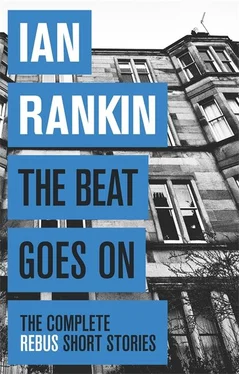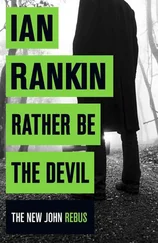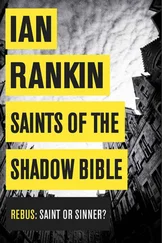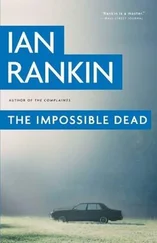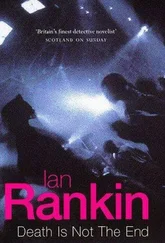Almost.
Simms was currently looking uncomfortable, eyes darting around him. ‘He’s usually only seen at night, our resident ghost. More often it’s the creaking of the floorboards the workers hear. He paces up and down... up and down...’ He made a sweeping gesture with his arm. The narrow walkway was flanked by rectangular stainless-steel fermentation tanks. This was where the yeast did its work. Some vats were three-quarters full, each topped with a thick layer of brown foam. Others were empty, either clean or else waiting to be sluiced and scrubbed.
‘His name was Johnny Watt,’ Simms went on. ‘Sixty years ago he died — almost to the day.’ Simms’s eyes were rheumy, his face blotchy and pockmarked. He’d retired a decade back, but liked leading the tours. They kept him fit. ‘Johnny was up here on his own. His job was to do the cleaning. But the fumes got him.’ He pointed towards one of the busier vats. ‘Take too deep a breath and you can turn dizzy.’
‘He fell in?’ Siobhan Clarke guessed.
‘Aye,’ Simms appeared to agree. ‘That’s the story. Banged his head and wasn’t found for a while.’ He slapped the rim of the nearest vat. ‘They were made of stone back then, and metal-lined.’ His eyes were on Rebus again. ‘A fall like that can do some damage.’
There were murmurs of agreement from the other visitors.
‘Two more stops,’ Simms told them, clapping his hands together. ‘Then it’s the sample room...’
The sample room was laid out like a rural pub, its brickwork exposed. Simms himself manned the pumps while the others removed their safety-ware. Rebus offered a brief toast to the guide before taking his first gulp.
‘That was interesting,’ Siobhan offered. Simms gave a nod of thanks. ‘Is it really sixty years ago? Almost exactly, I mean — or do you tell all the tours that?’
‘Sixty years next week,’ Simms confirmed.
‘Ever seen the ghost yourself, Albie?’
Simms’s face tightened. ‘Once or twice,’ he admitted, handing her a glass and taking Rebus’s empty one. ‘Just out the corner of my eye.’
‘And maybe after a couple of these,’ Rebus added, accepting the refill. Simms gave him a stern look.
‘Johnny Watt was real enough, and he doesn’t seem to want to go away. Quite a character he was, too. The beer was free to employees back then, and no limits to how much you had. Legend has it Johnny Watt could sink a pint in three seconds flat and not be much slower by the tenth.’ Simms paused. ‘None of which seemed to stop him being a hit with the ladies.’
Clarke wrinkled her nose. ‘Wouldn’t have been a hit with me.’
‘Different times,’ Simms reminded her. ‘Story goes, even the boss’s daughter took a bit of a shine to him...’
Rebus looked up from his glass, but Simms was busy handing a fresh pint to one of the other visitors. He fixed his eyes on Siobhan Clarke instead, but she was being asked something by a woman who had come on the tour with her husband of twenty years. It had been his birthday present.
‘Is it the same with you and your dad?’ the woman was asking Clarke. ‘Did you buy him this for his birthday?’
Clarke replied with a shake of the head, then tried to hide the fact that she was smiling by taking a long sip from her glass.
‘You might say she’s my “companion”,’ Rebus explained to the woman. ‘Charges by the hour.’
He was still quick on his toes; managed to dodge the beer as it splashed from Siobhan Clarke’s glass...
The next day, Rebus was back at the brewery, but this time in the boardroom. Photos lined the walls. They showed the brewery in its heyday. At that time, almost a century ago, there had been twenty other breweries in the city, and even this was half what there had been at one time. Rebus studied a posed shot of delivery men with their dray horse. It was hitched to its cart, wooden barrels stacked on their sides in a careful pyramid. The men stood with arms folded over their three-quarter-length aprons. There was no date on the photograph. The one next to it, however, was identified as ‘Workers and Managers, 1947’. The faces were blurry. Rebus wondered if one of them belonged to Johnny Watt, unaware that he had less than a year left to live.
On the wall opposite, past the large, polished oval table, were portraits of twenty or so men, the brewery managers. Rebus looked at each of them in turn. The one at the end was a colour photograph. When the door opened and Rebus turned towards the sound, he saw the man from the portrait walk in.
‘Douglas Cropper,’ the man said, shaking Rebus’s hand. He was dressed identically to his photo — dark blue suit, white shirt, burgundy tie. He was around forty and looked the type who liked sports. The tan was probably put there by nature. The hair showed only a few flecks of grey at the temples. ‘My secretary tells me you’re a policeman...’
‘Was a policeman,’ Rebus corrected him. ‘Recently retired. I might not have mentioned that to your secretary.’
‘So there’s no trouble, then?’ Cropper had pulled out a chair and was gesturing for Rebus to sit down too.
‘Cropper’s a popular name,’ Rebus said, nodding towards the line of photographs.
‘My grandfather and my great-grandfather,’ Cropper agreed, crossing one leg over the other. ‘My father was the black sheep — he became a doctor.’
‘In one picture,’ Rebus said, ‘the inscription says “workers and managers”...’
Cropper gave a short laugh. ‘I know. Makes it sound as if the managers don’t do any work. I can assure you that’s not the case these days.’
‘Your grandfather must have been in charge of the brewery when that accident happened,’ Rebus stated.
‘Accident?’
‘Johnny Watt.’
Cropper’s eyes widened a little. ‘You’re interested in ghosts?’
Rebus offered a shrug, but didn’t say anything. The silence lengthened until Cropper broke it.
‘Businesses weren’t so hot on health and safety back then, I’m afraid to say. Lack of ventilation... and nobody partnering Mr Watt.’ Cropper leaned forward. ‘But I’ve been here the best part of twenty years, on and off, and I’ve never seen anything out of the ordinary.’
‘You mean the ghost? But other people have?’
It was Cropper’s turn to shrug. ‘It’s a story, that’s all. A bit of shadow... a squeaky floorboard... Some people can’t help seeing things.’ He sat back again and placed his hands behind his head.
‘Did your grandfather ever talk to you about it?’
‘Not that I remember.’
‘Was he still in charge when you started here?’
‘He was.’
Rebus thought for a moment. ‘What would have happened after the accident?’ he asked.
‘I dare say the family would have been compensated — my grandfather was always very fair. Plenty of evidence of it in the annals.’
‘Annals?’
‘The brewery’s records are extensive.’
‘Would they have anything to say about Johnny Watt?’
‘No idea.’
‘Could you maybe look?’
Cropper’s bright blue eyes drilled into Rebus’s. ‘Mind explaining to me why?’
Rebus thought of Albie Simms’s words: Johnny Watt was real... and he doesn’t seem to want to go away... But he didn’t say anything, just bided his time until Douglas Cropper sighed and began getting to his feet.
‘I’ll see what I can do,’ Cropper conceded.
‘Thank you, sir,’ Rebus said.
‘You’re supposed to be retired,’ Dr Curt said.
In the past, the two men would normally have met in the city mortuary, but Rebus had arrived at the pathologist’s office at the university, where Curt maintained a full teaching load between autopsies. The desk between them was old, ornate and wooden. The wall behind Curt was lined with bookshelves, though Rebus doubted the books themselves got much use. A laptop sat on the desk, its cover closed. There was no paperwork anywhere.
Читать дальше
